Themistocles
Themistocles (c.525-459): Athenian military commander, statesman, and one of the main architects of the Athenian Empire.
Early Career
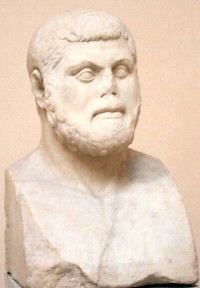
Themistocles was born in a village named Phrearrhioi as the son of a man named Neocles. His mother was a non-Athenian from Thrace or Caria. According to Themistocles' biographer Plutarch of Chaeronea, the young man "was of a vehement and impetuous nature, of a quick apprehension, and a strong and aspiring bent for action and great affairs", but this is probably nothing but a retroprojection. In Antiquity, it was widely believed that great statesmen already showed their qualities when they were still young. It is only when Themistocles obtained the office of archon in 493/492 BCE that he becomes "visible" for us. After his tenure of this office, he became member of the Areopagus, the influential council of former magistrates.
In those years, Athens was involved in two major foreign conflicts. The most important seemed to be the war with the island Aegina, which could threaten Athenian commerce as it was situated opposite the port of Athens, Phaleron. The other conflict was with the Persian empire in the east. In the third quarter of the sixth century, the Persian king Cyrus the Great (559-530) had conquered the Greek cities of Asia Minor, but in 499, they had revolted against king Darius I the Great (522-486), and Athens had briefly supported the rebels.
Archon
When Themistocles was archon, the Persians were restoring order, and it was rumored that the Persians would one day invade Europe to punish the Athenians. The Greek researcher Herodotus of Halicarnassus, writing half a century later, believed that Darius wanted revenge. In 492, the great king sent his relative Mardonius to conquer Macedonia, and in 490, his generals Datis and Artaphernes conquered the Aegean islands. After this, they wanted to bring back Hippias, the former tyrant of Athens, to his native city, but they were defeated by the Athenian general Miltiades near Marathon (on 10 September or 12 August 490). According to later sources, one of the Athenian vice-commanders was Themistocles. It may be true, but it is more likely that the story was inspired by Themistocles' later successes against the same enemy.
It seems that by now, Themistocles already was a controversial politician. The Athenian democracy appears to have been in some state of turmoil and in six successive years, as many politicians were ostracized, including Xanthippus (the father of Pericles) and Aristides (surnamed "the Just"). There is additional, archaeological evidence for these ostracisms in the form of a great many potsherds, excavated at the Athenian agora, mentioning several well-known political leaders. Among them, Themistocles figures prominently. We do not know why he was so controversial, but it may be that his policies, which were later considered to be radical, were already leading to critical questions. On the other hand, he was not ostracized.
In the year 483/482, a vein of silver was discovered near Laurion, southeast of Athens. Under normal circumstances, the state would have given every citizen a sum of money and would have leased out the mining rights. Themistocles, however, proposed to use the money to build warships. The war between Athens and Aegina had already lasted several years, and Themistocles argued that the Athenian ships were no match for the larger fleet of the enemy.
The Athenian People's Assembly (ekklesia) accepted this argument, but many must have seen through the proposal. In the east, the Persian king Darius had been succeeded by his son Xerxes, who had ordered a full-scale expedition against the "Yaunâ", the Greeks. His engineers were already digging a canal through the Athos (text), and it was easy to understand that Xerxes wanted to use a very large fleet to support his army during the invasion of Greece. Themistocles' shipbuilding program was directed against Persia, not Aegina.
But there's more to this than meets the eye. The obvious lesson of Marathon had been that the Persians could be defeated by heavily-armed infantry (the hoplites). Not everyone could buy a panoply, and most Greek infantry units were, consequently, dominated by more or less rich men. Building a navy meant that the Athenians wanted to employ poor people as rowers. Themistocles' policy, therefore, meant the radicalization of the democracy. He also laid the foundations of what was to become a naval empire.
Many traditional politicians must have objected to the shipbuilding policy, which was revolutionary, but they knew that there was no alternative: if Xerxes needed to dig a canal for his fleet, he needed many ships, and if he needed many ships, he wanted to support a very large army. The Persian king had understood the lesson of Marathon too: the Greek infantry could only be defeated with a very large numerical superiority.
The Persian War
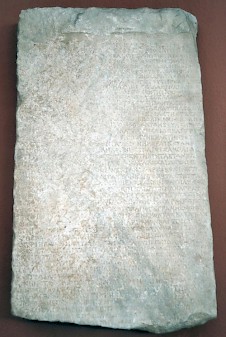
There were many other Greek politicians who understood what was about to happen, and in the autumn of 481, they organized a congress in Corinth to prepare for the war against the invaders. It is at this stage that Themistocles convinced the Athenians that they had to prepare for the evacuation of their city. Our main source, the Histories by Herodotus, suggests that the city was evacuated much later, but an inscription found at Troezen suggests otherwise. The stela contains the text of a decision by the People's Assembly that the Athenians must leave their homes, settle their families in Troezen, recall the exiles (a/o Aristides and Xanthippus), and fight against the Persian invader. The navy was sent to two places: Artemisium and Salamis. The decree was proposed by Themistocles.
Artemisium and Salamis are the exact locations where the Greeks fought against the Persians in the autumn of 480, and several scholars have found this suspicious. Besides, the letters of the inscriptions clearly belong to a later date and several formulas are unusual for the first quarter of the fifth century. However, although the inscription must be dated in c.300 BCE, the main text is probably authentic, and proves that Themistocles foresaw that the Greek armies would be unable to prevent the Persian invasion, and knew that the only place to defeat the Persians was at sea - near Artemisium and Salamis.
At about the same time - king Xerxes had already reached Sardes in Lydia - the Greeks sent envoys to the oracle of Delphi, asking advise from the god. At first, Apollo suggested the Greeks to flee to the edges of the earth, but on Themistocles' request the god advised them to rely upon "a wooden wall", i.e., the navy. A brief Greek expedition to the north in the spring of 480, to check if it was possible to defend Greece at Tempe, was soon aborted.
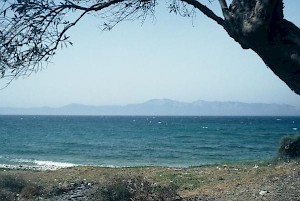
In the summer, the Persians finally invaded Greece and defeated the Spartan infantry that guarded Thermopylae. At the same time, the Persians found the Greek navy on its way near Artemisium. Its admiral was Eurybiades, the commander of the small Spartan flotilla. However, the Athenians had manned 127 galleys and it was natural that the real Greek commander was Themistocles. When the Persian fleet arrived at the opposite shore, Eurybiades wanted to retreat, but Themistocles - who wanted to counter the Persian offensive before it reached Athens - bribed him to stay. For two days, the Persians and Greeks fought, but on the third day, the invaders repelled the defenders. The Greeks would have had to evacuate their position anyhow, because Thermopylae had fallen and the Persian cavalry might attack them in the rear.
Salamis
After the fall of Thermopylae and the evacuation of Artemisium, Athens was lost. Defending the city in Boeotia would have been an act of gallant irresponsibility, because the superior Persian numbers would have outmatched the brave Greek soldiers. The only hope for Athens and for Greece was to prevent Xerxes to keep this large army, and this was only possible by destroying the Persian transport fleet. Lack of food would force the invader to return. Unfortunately, the Greeks had failed to do so at Artemisium, and the invaders easily reached Athens. However, the Greek navy was still more or less intact and had occupied the island Salamis, opposite the Athenian port at Phaleron.
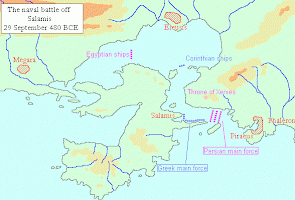
Herodotus tells about talks among the Greek admirals, but his reports are confused. One of his claims is that the others wanted to sail away and Themistocles had to blackmail them. If the other Greeks would leave Salamis, the Athenians would give up the struggle, take their families on board and sail to Italy with their navy of 200 vessels. The result of this blackmail was, according to Herodotus, that everyone agreed to stay. This is not very likely, because the Greek position at Salamis was excellent.
Another story is that the admirals became scared when they saw the approaching enemy fleet. Again: unlikely, because they had already seen the Persians at Artemisium. Herodotus says that Themistocles understood that the others would only fight if the Persians attacked them - but why should they enter the shallow and narrow bay? Therefore, Themistocles sent a messenger to inform Xerxes that if he wanted an easy victory, he should attack immediately, because the Greeks were to leave the island at dawn. Xerxes swallowed the bait, and ordered his fleet to enter the bay under cover of an almost moonless night. At dawn of 29 September 480, however, the Persian navy suddenly found itself under attack; since the bay was narrow, their superior numbers meant nothing, and they were forced to retreat.
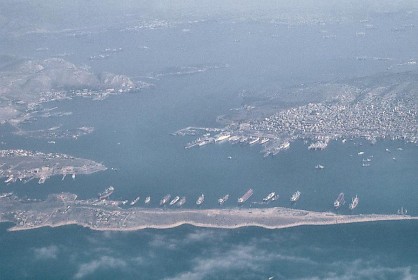
The reality of the stratagem of the informer has been doubted by several historians. Yet, the story is also told in the tragedy The Persians by the playwright Aeschylus, written only a couple of years after the naval battle. It is possible that it is true. However this may be, "Salamis" meant the end of the Persian offensive. The navy was too damaged to continue the war.
It should be stressed that from a Persian perspective, the "Greek war" was not yet lost after Salamis. On the contrary. Xerxes had won a naval victory off Artemisium and had won a battle at Thermopylae. He had added Thessaly and Boeotia to the Persian empire and had captured Athens. In spite of the losses at Salamis, Xerxes could truthfully state in his Daiva inscription that he ruled "all the Yaunâ, those who dwell on this side of the sea and those who dwell across the sea".
Later Career
Themistocles was now at the zenith of his fame. Next year, his decline started. There was no need for a naval policy anymore: the Persians had recalled many troops, and what remained was defeated by the Spartan general Pausanias at Plataea in the summer of 479. The commander of the Athenian regiment was Aristides. Nor was Themistocles present when the Greek navy attacked the remains of the Persian fleet at Mycale; here, the commander was Xanthippus. (Both men had been recalled from ostracism by Themistocles.)
Still, Themistocles was an influential man, and in the winter of 479/478, he visited Sparta as a guest of honor. His hosts soon regretted their hospitality. There were persistent rumors that the Athenians were building new walls, but Themistocles told the Spartan authorities that he was unaware of this project. The Spartans believed him, not knowing that Themistocles was just trying to gain time. In the end, however, he admitted that the Athenians had indeed fortified their city, and that the Spartans, who had commanded the Athenians during the war against Xerxes, now had to treat their former subjects as their equals.
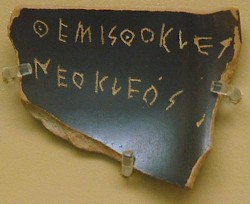
Themistocles' role in the 470s is unclear, but he played a role in the founding of Piraeus as Athens' new port, and it is certain that the Athenians thought he was becoming too powerful. Therefore, he was ostracized and settled in Argos, where - in spite of his exile still an Athenian nationalist - he continued an anti-Spartan policy, until the Spartans informed the Athenians that Themistocles was negotiating with king Xerxes. This was probably untrue, but the Athenians converted the ostracism into a death sentence, and the Argives extradited him.
Exile
Themistocles was able to escape, but where did he have to go? In the end, he choose Persia. After all, it was believed in Greece that he had wanted to betray Athens to the Persians, and perhaps the great king believed this strange rumor too. So, Themistocles settled in Magnesia in Asia Minor. Our sources are unclear about the name of the Persian king who offered asylum. It may have been Xerxes himself, in which case the Athenian arrived in the first half of the 460s; or it may have been Xerxes' son Artaxerxes, who succeeded to the throne in 465.
In 459, Themistocles died, sixty-five years old. His tomb was still visible on the market of Magnesia in the second century CE. It is possible that the man who had saved Greece and had laid the foundations of the Athenian democratic sea-empire was forced to commit suicide. As proponent of a radical democracy, he was succeeded by Pericles, the son of Xanthippus.
Literature
Plutarch's Life of Themistocles is available at LacusCurtius.